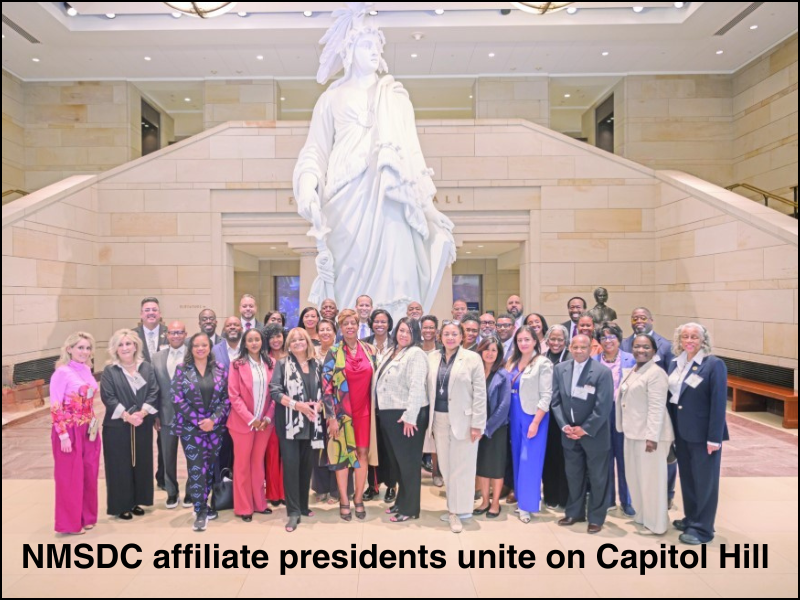By Zachary
Rinkins
Minority-owned
businesses have faced a competitive landscape that has long demanded agility,
resilience and innovation. In today’s environment — with federal programs in
flux and companies reevaluating their approach to supplier diversity — the 23
regional affiliates of National Minority Supplier Development Council Inc.
(NMSDC) are working to ensure that diverse suppliers not only remain in the
pipeline but also thrive.
Patricia
Crenshaw is chair of the NMSDC Affiliate Councils’ Presidents Group, which
represents the regional affiliates. She is also president and CEO of the
Pacific Southwest Minority Supplier Development Council.
“Our goal
is to help small businesses navigate the landscape in any way we can,” Crenshaw
said. “Irrespective of the climate, our goal remains the same: Help these
enterprises grow and become sustainable.”
Unity
and accountability
After
nearly two years of negotiation, all 23 regional councils recently reached a
landmark agreement with NMSDC. The pact, she said, underscores a commitment to
collective accountability.
“The main
piece that comes out of the agreement is that the councils and the national
office [NMSDC] will be accountable for the success of the businesses we serve,”
Crenshaw said. “There are some other terms like indemnification and
transparency, but the main piece is that we are now accountable to each other,
and we must have key performance indicators [KPIs] to measure and accomplish
our goals.”
She remains
optimistic about working with NMSDC interim president and CEO, Don Cravins Jr.,
who took the helm in August 2025. (See related story on Page 12).
Over the
past year, he has served as an NMSDC board member and chair designee,
supporting the executive committee. From 2024 to 2025, Cravins was head of
government affairs and outreach at Williams Companies Inc. From 2022 to 2024,
he served as the first-ever undersecretary of minority business development at
the U.S. Department of Commerce’s Minority Business Development Agency (MBDA).
From 2021 to 2022, Cravins was executive vice president and chief operating
officer of the National Urban League, and from 2010 to 2022, he was an adjunct
professor in the School of Professional Studies at George Washington
University. From 2004 to 2009, Cravins was a member of the Louisiana State
Legislature.
“Don
Cravins Jr. has an impressive track record and tremendous credentials,”
Crenshaw said. “We look forward to working with him to deliver results for our
stakeholders.”
For member
businesses, that means that councils are aligning more closely with national
leadership to deliver measurable results. For corporations, it means greater
consistency and reliability when sourcing from suppliers.
Competing
in a shifting environment
Crenshaw
emphasized that minority-owned firms are not given contracts — they compete for
them.
“These
businesses have not been given anything,” she said. “It is an opportunity to be
considered for the opportunity — to have a seat at the table. Our member
businesses have always been in a competitive environment. Now, some of the
tables are not as readily available as they were last year. But those
businesses are accustomed to pivoting and can pivot faster than many
corporations.”
Crenshaw
said that during the COVID-19 pandemic, member firms demonstrated that agility
by shifting operations to meet urgent needs in areas such as masks and
sanitizers. That same creativity, she said, will be key to weathering current
challenges.
“This is a
time for creativity,” she said. “We will create programming and other avenues
to help them increase their bottom line. And that is why they get certified.”
Building
community and capacity
Certification
may open the door, but the Councils offer much more. Programs such as the
Minority Business Executive Program and North Central MSDC MBE [minority
business enterprise] CEO Academy foster peer networks, mentorship and skills
development.
“We are not
all about certification. We are about supporting businesses,” Crenshaw said.
“When I talk to new members, I talk about a community. Community partners
should continue to connect because things can change, but conversations keep
going.”
In the
programs, she noted, even competitors have found value in collaborating.
“Sometimes
it’s even competitors on that call, and they see that they have something else
in common as a CEO,” Crenshaw said. “Once you get to the top, it can be lonely.
But when you have peers you can trust, it makes a difference.”
The road
ahead
For both
member firms and corporate partners, the Councils’ value lies in preparing
suppliers to compete effectively — while providing companies with access to
innovative and dependable partners.
“For the
small businesses, it’s the ability to be competitive and agile,” Crenshaw said.
“For the Councils, we’re supportive. Our mission is to help members develop and
work together. The Councils provide education and resources to help you build
your business, to help you find a pathway that you didn’t see.”
As the
business climate evolves, the Councils are positioning themselves as both
advocates and solution providers.
“We will
navigate this time with our MBEs, our corporate members and our national
office,” Crenshaw said.
For small
businesses considering growth and for corporations seeking diverse suppliers,
the councils remain a vital bridge — one that aims to strengthen supply chains,
expand opportunities and build lasting community wealth.
To learn
more about NMSDC’s regional affiliates, visit
nmsdc.org/about/regional-affiliates.





